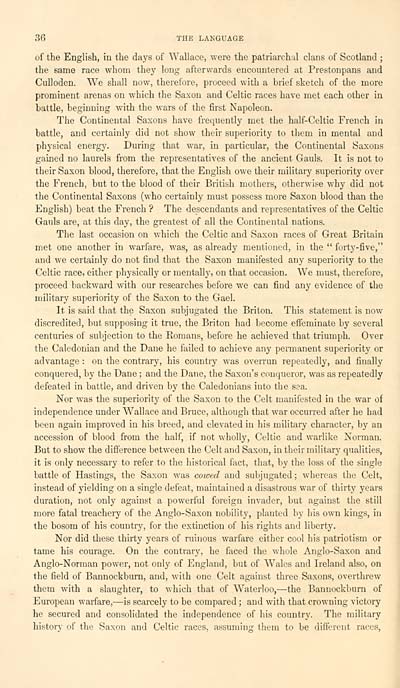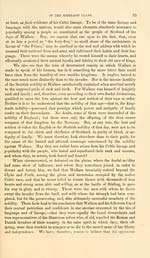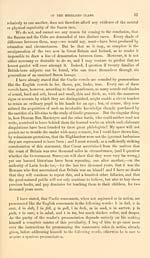Download files
Complete book:
Individual page:
Thumbnail gallery: Grid view | List view

36 THE LANGUAGE
of the English, in the days of Wallace, were the patriarchal clans of Scotland ;
the same race whom they long afterwards encountered at Prestonpans and
Culloden. We shall now, therefore, proceed with a brief sketch of the more
prominent arenas on which the Saxon and Celtic races have met each other in
battle, beginning with the wars of the first Napoleon.
The Continental Saxons have frequently met the half-Celtic French in
battle, and certainly did not show their superiority to them in mental and
physical energy. During that war, in particular, the Continental Saxons
gained no laurels from the representatives of the ancient Gauls. It is not to
their Saxon blood, therefore, that the English owe their militaiy superiority over
the French, but to the blood of their British mothers, otherwise why did not
the Continental Saxons (who certainly must possess more Saxon blood than the
English) beat the French ? The descendants and representatives of the Celtic
Gauls are, at this day, the greatest of all the Continental nations.
The last occasion on which the Celtic and Saxon races of Great Britain
met one another in warfare, was, as already mentioned, in the " forty-five,"
and we certainly do not find that the Saxon manifested any superiority to the
Celtic race, either physically or mentally, on that occasion. We must, therefore,
proceed backward with our reseai'ches before we can find any evidence of the
military superiority of the Saxon to the Gael.
It is said that the Saxon subjugated the Briton. This statement is now
discredited, but supposing it true, the Briton had become eifeminate by several
centuries of subjection to the Romans, before he achieved that triumph. Over
the (]!aledonian and the Dane he failed to achieve any permanent superiority or
advantage : on the contrary, his country was overrun repeatedly, and finally
conquered, by the Dane ; and the Dane, the Saxon's conqueror, was as repeatedly
defeated in battle, and driven by the Caledonians into the sea.
Nor was the superiority of the Saxon to the Celt manifested in the war of
independence under Wallace and Bruce, although that war occurred after he had
been again improved in his breed, and elevated in his military character, by an
accession of blood from the half, if not wholly, Celtic and warlike Norman.
But to show the difference between the Celt and Saxon, in their military qualities,
it is only necessary to refer to the historical fact, that, by the loss of the single
battle of Hastings, the Saxon was cowed and subjugated ; whereas the Celt,
instead of yielding on a single defeat, maintained a disastrous war of thirty years
duration, not only against a powerful foreign invader, but against the still
more fatal treachery of the Anglo-Saxon nobility, planted by his own kings, in
the bosom of his country, for the extinction of his rights and liberty.
Nor did these thirty years of ruinous warfare either cool his patriotism or
tame his courage. On the contrary, he faced the whole Anglo-Saxon and
Anglo-Norman power, not only of England, but of Wales and Ireland also, on
the field of Bannockburn, and, with one Celt against three Saxons, overthrew
them with a slaughter, to which that of Waterloo, — the Bannockburn of
European warfare, — is scarcely to be compared ; and with that crowning victory
he secured and consolidated the independence of his country. The military
history of the Saxon and Celtic races, assuming them to be different races.
of the English, in the days of Wallace, were the patriarchal clans of Scotland ;
the same race whom they long afterwards encountered at Prestonpans and
Culloden. We shall now, therefore, proceed with a brief sketch of the more
prominent arenas on which the Saxon and Celtic races have met each other in
battle, beginning with the wars of the first Napoleon.
The Continental Saxons have frequently met the half-Celtic French in
battle, and certainly did not show their superiority to them in mental and
physical energy. During that war, in particular, the Continental Saxons
gained no laurels from the representatives of the ancient Gauls. It is not to
their Saxon blood, therefore, that the English owe their militaiy superiority over
the French, but to the blood of their British mothers, otherwise why did not
the Continental Saxons (who certainly must possess more Saxon blood than the
English) beat the French ? The descendants and representatives of the Celtic
Gauls are, at this day, the greatest of all the Continental nations.
The last occasion on which the Celtic and Saxon races of Great Britain
met one another in warfare, was, as already mentioned, in the " forty-five,"
and we certainly do not find that the Saxon manifested any superiority to the
Celtic race, either physically or mentally, on that occasion. We must, therefore,
proceed backward with our reseai'ches before we can find any evidence of the
military superiority of the Saxon to the Gael.
It is said that the Saxon subjugated the Briton. This statement is now
discredited, but supposing it true, the Briton had become eifeminate by several
centuries of subjection to the Romans, before he achieved that triumph. Over
the (]!aledonian and the Dane he failed to achieve any permanent superiority or
advantage : on the contrary, his country was overrun repeatedly, and finally
conquered, by the Dane ; and the Dane, the Saxon's conqueror, was as repeatedly
defeated in battle, and driven by the Caledonians into the sea.
Nor was the superiority of the Saxon to the Celt manifested in the war of
independence under Wallace and Bruce, although that war occurred after he had
been again improved in his breed, and elevated in his military character, by an
accession of blood from the half, if not wholly, Celtic and warlike Norman.
But to show the difference between the Celt and Saxon, in their military qualities,
it is only necessary to refer to the historical fact, that, by the loss of the single
battle of Hastings, the Saxon was cowed and subjugated ; whereas the Celt,
instead of yielding on a single defeat, maintained a disastrous war of thirty years
duration, not only against a powerful foreign invader, but against the still
more fatal treachery of the Anglo-Saxon nobility, planted by his own kings, in
the bosom of his country, for the extinction of his rights and liberty.
Nor did these thirty years of ruinous warfare either cool his patriotism or
tame his courage. On the contrary, he faced the whole Anglo-Saxon and
Anglo-Norman power, not only of England, but of Wales and Ireland also, on
the field of Bannockburn, and, with one Celt against three Saxons, overthrew
them with a slaughter, to which that of Waterloo, — the Bannockburn of
European warfare, — is scarcely to be compared ; and with that crowning victory
he secured and consolidated the independence of his country. The military
history of the Saxon and Celtic races, assuming them to be different races.
Set display mode to: Large image | Transcription
Images and transcriptions on this page, including medium image downloads, may be used under the Creative Commons Attribution 4.0 International Licence unless otherwise stated. ![]()
| Early Gaelic Book Collections > Blair Collection > Treatise on the language, poetry, and music of the Highland clans > (48) |
|---|
| Permanent URL | https://digital.nls.uk/76236931 |
|---|
| Description | A selection of books from a collection of more than 500 titles, mostly on religious and literary topics. Also includes some material dealing with other Celtic languages and societies. Collection created towards the end of the 19th century by Lady Evelyn Stewart Murray. |
|---|
| Description | Selected items from five 'Special and Named Printed Collections'. Includes books in Gaelic and other Celtic languages, works about the Gaels, their languages, literature, culture and history. |
|---|

